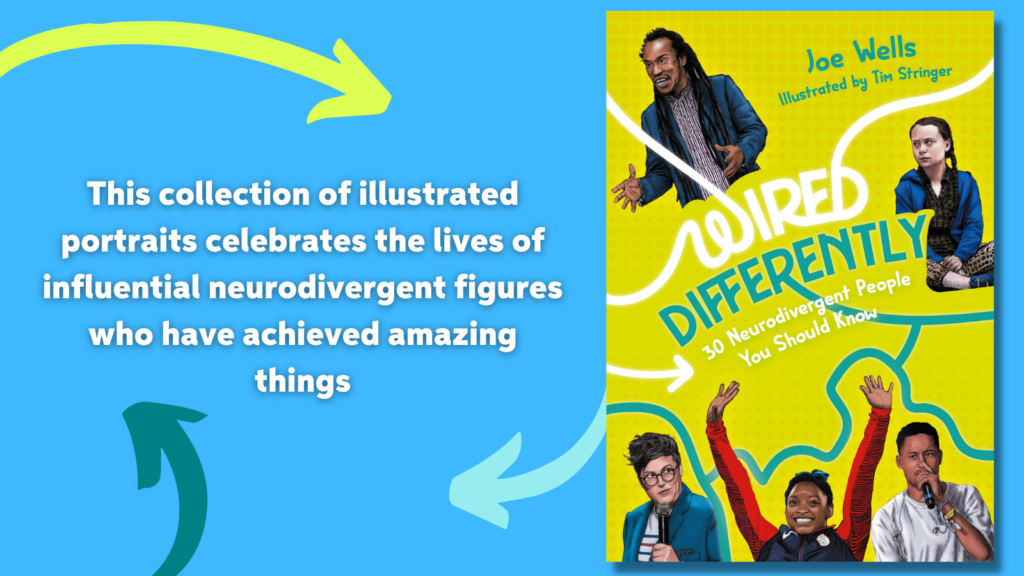Wired Differently
Stand-up comedian and writer Joe Wells’ new book, Wired Differently, showcases 30 incredible people and the things they’ve achieved, created and inspired not despite being different but because they are different. From politicians, activists and journalists, to YouTubers, DJs and poets, this book highlights a wide range of exciting, aspirational and inspirational career paths for neurodivergent and neurotypical readers of all ages.

“Would you rather go to the theatre or a museum?”
I was asked this question in 2019 as part of an assessment to see if I would receive an official Autism diagnosis. The belief is that autistic people prefer museums because they’re quieter than theatres. The reality is that museums can be very noisy, especially on school holidays, and I once did a stand-up gig at a theatre in Guildford where the audience were completely silent. I do like museums but not because they’re quiet, if all I cared about was quiet then I’d stay at home in my quiet house. It’s a silly question, everyone knows it’s a silly question, but it’s still asked because we want some sort of measure so we can decide who gets to be autistic and who doesn’t.
There’s lots which I believe needs to change about how we diagnose Autism. Last year I met someone who – because they met 2 out of 3 of the main diagnostic criteria – was told that they were “two thirds autistic.” I wondered if they were autistic up to their armpits or if the two thirds autisticness was evenly distributed around their whole body?
People cleverer than me have written about the biases in diagnosis and who gets put forward for assessment. If you don’t fit a stereotype of the high-achieving white boy with a Doctor Who obsession then people think you can’t be autistic. The diagnosis also focuses on what autistic people struggle with, but I believe that the things I’m good at are directly linked to me being autistic (I do stand-up comedy as a job which is basically a long one-way conversation about my special interests – the perfect job for an autistic).
So if the diagnosis process is flawed, what do we do? One answer is to create new sub-groups for autistic people. But the problem with that is that we’re so infinitely different eventually we’ll each have our own individual subgroup – “well, we’ve finished our assessment and we are diagnosing you with Autism type 6732867”
The neurodiversity movement of recent years is not worried about policing who gets to be autistic or not. They use the term “neurodivergent” as an umbrella term for autistic people and anyone whose brain doesn’t work the way that society expects it to (that might include people with diagnosis of ADHD, Dyslexia, Dyspraxia or even people who don’t neatly fit a diagnosis like the “two thirds autistic” person). There’s no strict criteria for neurodivergent, you can be neurodivergent if you like museums, or theatres, or even BOTH (if you’re in the latter group may I recommend the Museum of Theatre).
So what does it mean to be neurodivergent? I think a good starting point is the stories of neurodivergent people. That’s why I wrote a book about 30 of them. I read about, watched and spoke to fascinating neurodivergent people from all different backgrounds. Each one had experiences which were completely different to mine. I’ve never had to flee war, I’ve never been to prison and I’ve not yet won an Olympic gold medal in gymnastics (at 34 next year so this is looking increasingly unlikely).
But, whilst they were all different to me, every neurodivergent person I learned about had something in their experiences which I connected with. They were almost all underestimated, bullied, defined by others by the things they struggled with, and they all succeeded only when they embraced their unusual brain wiring.
Neurodivergent is a whole new way of defining people like me. It’s not about medical diagnosis or ticking a list of criteria. It focuses on the experiences we have in common, the prejudices we face and the social change which will benefit us all.
Wired Differently is available to order from the JKP website or wherever you buy books. Find Joe Wells on Twitter here.
If you would like to read more articles like this and get the latest news and exclusive offers on our books about neurodiversity, why not join our mailing list? You may also be interested in our Facebook page or Twitter page.